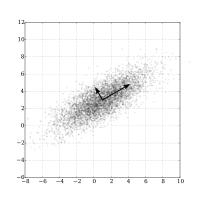
Photo from wikipedia
With the digital transformation of process manufacturing, identifying the system model from process data and then applying to predictive control has become the most dominant approach in process control. However,… Click to show full abstract
With the digital transformation of process manufacturing, identifying the system model from process data and then applying to predictive control has become the most dominant approach in process control. However, the controlled plant often operates under changing operating conditions. What is more, there are often unknown operating conditions such as first appearance operating conditions, which make traditional predictive control methods based on identified model difficult to adapt to changing operating conditions. Moreover, the control accuracy is low during operating condition switching. To solve these problems, this article proposes an error-triggered adaptive sparse identification for predictive control (ETASI4PC) method. Specifically, an initial model is established based on sparse identification. Then, a prediction error-triggered mechanism is proposed to monitor operating condition changes in real time. Next, the previously identified model is updated with the fewest modifications by identifying parameter change, structural change, and combination of changes in the dynamical equations, thus achieving precise control to multiple operating conditions. Considering the problem of low control accuracy during the operating condition switching, a novel elastic feedback correction strategy is proposed to significantly improve the control accuracy in the transition period and ensure accurate control under full operating conditions. To verify the superiority of the proposed method, a numerical simulation case and a continuous stirred tank reactor (CSTR) case are designed. Compared with some state-of-the-art methods, the proposed method can rapidly adapt to frequent changes in operating conditions, and it can achieve real-time control effects even for unknown operating conditions such as first appearance operating conditions.
Journal Title: IEEE transactions on neural networks and learning systems
Year Published: 2023
Link to full text (if available)
Share on Social Media: Sign Up to like & get
recommendations!